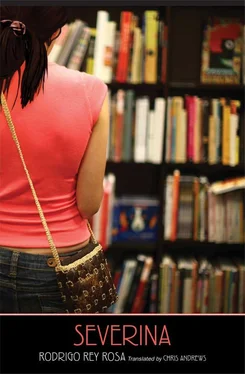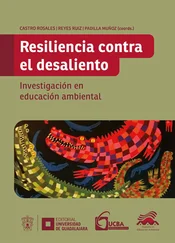Like Severina and Otto Blanco, the narrator and Ahmed al Fahsi exploit the ebbs and flows of the book trade. Ahmed says they are “like alchemists,” a reflection prompted perhaps by the book he has been reading— Conversations Between Alchemists (“Conversaciones entre alquimistas”) by Jorge Riechmann — which he gives to the narrator as a present. Perhaps the gift is also prompted by the book, in which Riechmann writes: “Capital wants to make us believe that we are what we sell. But we are what we give away.” Ahmed does seem strongly influenced by Riechmann, for the words the narrator overhears him saying on the telephone—“There’s no money for the famine in Africa, but there’s money to send satellites into space”—are lifted almost verbatim from Conversations Between Alchemists, as the narrator finds out (but indicates in a way so subtle it could easily be missed) when he opens the book at random. Here it seems that a book is exploiting its reader, using him to propagate its content, as if it were animated by an autonomous spirit, in line with the beliefs of Otto Blanco’s eccentric uncle, for whom books are the agents of a global struggle for domination.
There are, however, limits to Ahmed’s generosity, for he intends to make Severina pay in full for her thieving, one way or another. The narrator, on the other hand, declines Señor Blanco’s offer to reimburse him for the stolen books and eventually tires of the “alchemy” of converting printed matter into gold: “I had begun to feel that there was something crass about simply trading books for money.” He longs to escape from the book trade and into the gift economy of art (when he tells his friends he wants to go away and “try his luck at writing a novel,” he is hiding the main reason for his decision to travel, but not necessarily lying). Similarly, toward the end of the novel, having committed himself to a large and indefinite expense for the sake of love, he feels “released from. . an ingrained but strange vanity — the obscure vanity of the single man.”
In Rey Rosa’s fiction, access to the characters’ mental worlds is limited. This is not to say forbidden: he is not a behaviorist writer. When we enter the minds of his characters, it is most often through fear. Fear with its physical symptoms and its complex phenomenology, fear not as a weakness or an illness but as a fact of daily life in certain societies, is a central motif in Rey Rosa’s work. Here Severina is, again, exceptional, because we enter the narrator’s inner world through desire and anxious longing. Yet fear is not altogether absent, for if love releases the narrator from the vanity of the single man, he is released into unknown territory. The object of his love remains in many ways a blank (as Severina’s matronym Blanco suggests). The uncertainty surrounding her identity and her nature is artfully sustained, and Rey Rosa’s skill in balancing ambiguities is evident when Severina shows Ahmed a copy of the Koran she claims to have stolen from Borges’s library, on a page of which the Argentine master has apparently made a note toward one of his stories: “The Mirror of. .” This is presumably “The Mirror of Ink” from A Universal History of Infamy, which contains a quotation from the Koran, and in which a tyrant’s desire to know and see all precipitates his violent death. But by cutting the title short Rey Rosa also alludes to a later text by Borges, the essay “The Mirror of the Enigmas” from Other Inquisitions, which glosses Léon Bloy’s unwittingly cabalistic variations on I Corinthians 13:12: “For now we see through a glass, darkly; but then face to face: now I know in part; but then I shall know even as also I am known.” If, as Borges imagines in a footnote to that essay, we are tracing a significant figure with every step we take, the nature of that figure is not ours to see, not, at any rate, on this side of the glass or the mirror. In the last three sentences of Severina, the narrator, imagining the future and the unknown figure he is tracing, uses the word perhaps ( quizá ) three times. It is, I think, one of the key words of this brief and limpidly written novel, which, like all of Rodrigo Rey Rosa’s fiction, ripples over dreamlike and unquiet depths.
What power has love but forgiveness?
— William Carlos Williams, “Asphodel, That Greeny Flower,” Book 3
I noticed her the first time she came in the store, and right from the start I picked her for a thief, although that day she didn’t take anything.
On Monday afternoons there were usually poetry readings at La Entretenida, the bookstore I’d recently opened with a group of friends. We didn’t have anything better to do and we were tired of paying through the nose for books chosen by and for others, as “eccentrics” like us are forced to do in provincial cities. (There are far more serious problems here, but I don’t want to talk about all that now.) So, to put an end to this annoyance, we decided to start our own store.
I had just split up with the latest love of my life, a Colombian woman. It had been both simple and impossibly complicated, a waste of time or a wonderful adventure, depending on your point of view.
The bookstore wasn’t very big, but at the back there was room to set up tables and chairs for the events, which varied from straightforward readings to performances and burlesque.
When I saw her come in that first afternoon, a downpour had flooded the passages in the basement of the little shopping center where we had our premises; the clients had to walk from store to store on planks supported by blocks of cement and recycled bricks. She was wearing tights with high, flat-heeled boots and a white cotton blouse. Her hair was very black. She didn’t seem all that young. She left before the end of the reading (of prose poems, which sounded very good to me), but I knew she’d be back.
From one afternoon to the next I kept waiting for her. Why was I so sure that she’d be back? I wondered. I didn’t know.
Eventually, one Monday afternoon, she turned up. The reading had already begun. She stood by the curtains that separated the main part of the store from the little space where the readings were held. This time she was wearing a rather loose-fitting dress made from a single piece of blue cotton, which came down to her knees (perfectly rounded knees they were, shaped with evident care), a broad silver-plated belt, and black leather sandals. She was carrying a sequined handbag. She stayed until the end. She went to get a drink at the bar, exchanged glances and greetings, and, before leaving, slipped two little books from the Japanese literature section into her bag. The speed of it was impressive. Then she walked out through the door in no hurry at all. The alarm didn’t go off; I wondered how she’d done it. I let her go: again, I was sure she’d be back.
A moment later I went over to the Japanese shelf. I noted down the missing titles in a ledger, along with the date and the time. Then I went to the cubicle that enclosed the cash register and sat there, trying to imagine where she would go with the books.
The next time, two or three weeks later, when I saw her come in, I said good afternoon and asked if she was looking for something in particular.
“Yes, I’m looking for a present,” were the first words I heard her say.
“Can I ask who it’s for?”
“For my boyfriend,” she said. She had an unidentifiable accent.
“Well, you’re the best judge. There are some new books in the Japanese literature section.”
Her face lit up.
“Ah,” she said, “I love Japanese literature.”
“It’s over there.” I pointed to the far side of the store. “As you know.”
Читать дальше












